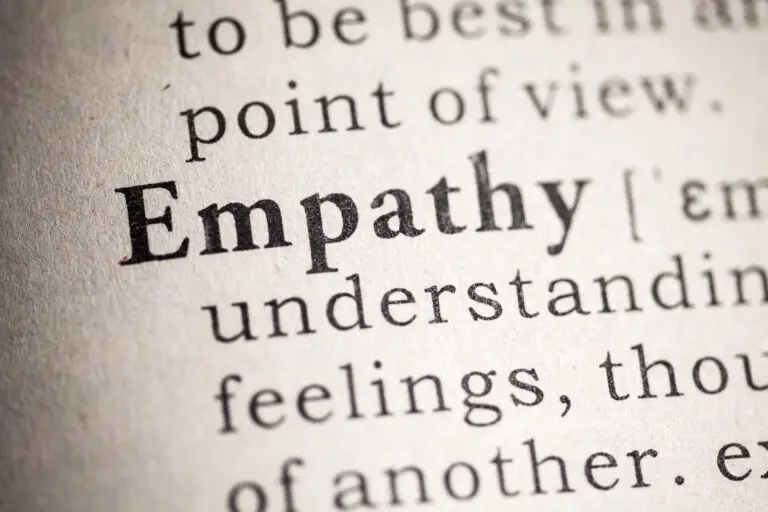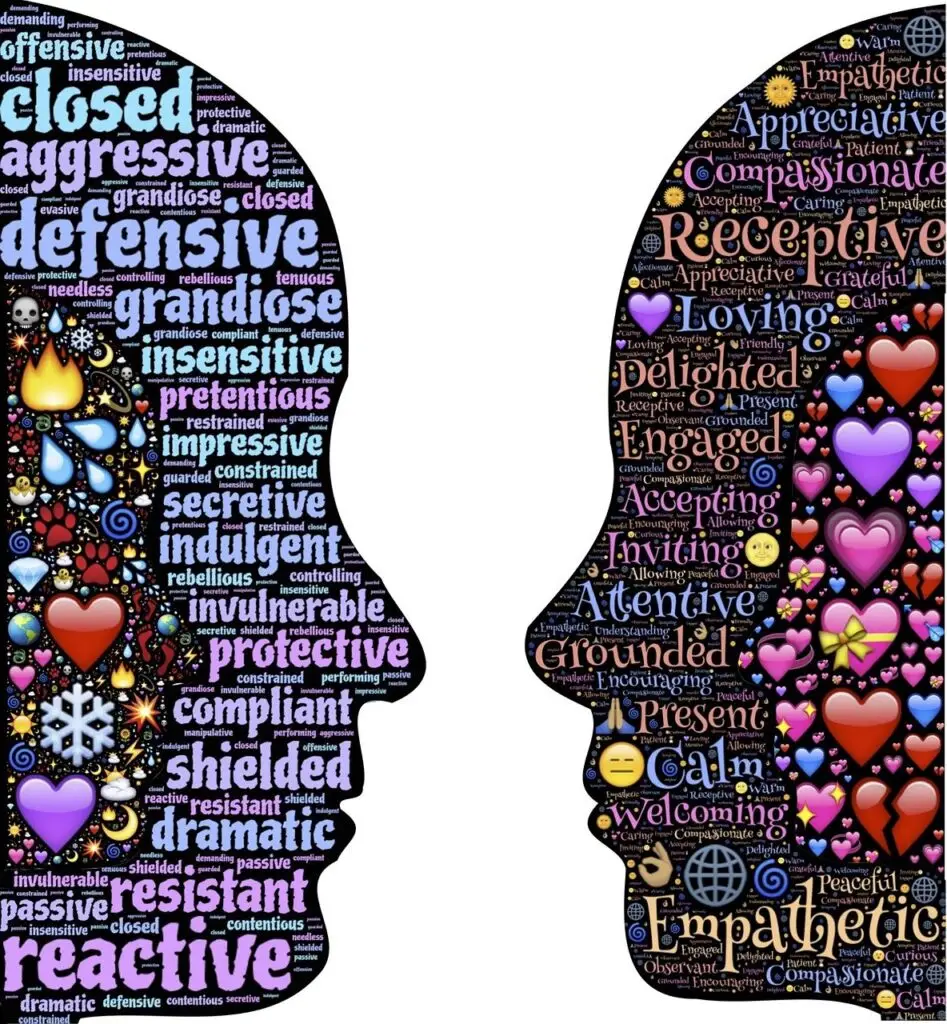What is Empathy?
Empathy is the ability to understand and share the feelings of another. It helps us to establish relationships with others and to resolve conflicts and misunderstandings. It can encourage self-reflection, altruism, forgiveness, cooperation and personal growth. The more empathic we are, the stronger our sense of well-being.
The Complex Relationship Between Narcissists and Empathy
How Empathy Develops
Empathy involves the ability to recognise and understand another person’s perspective and how they are feeling. For a child, it usually emerges within the second year of life and its development greatly depends on the nature of the relationships in the child’s family home and with their caregivers. Innate characteristics are also a factor here – so empathy is shaped by nature and nurture. Babies’ social interactions begin mainly with a primary caregiver and the empathic capabilities of the caregiver are crucial for a secure and healthy attachment style to develop (see attachment theory). When children have developed a secure attachment style, they are more responsive to the needs of others and are less hostile to out-group members and more empathic towards people in need.
From the perspective of neuroscience, there are two main subdivisions of empathy which are; emotional (i.e., responses to facial expressions and what the other person is saying) and cognitive (the understanding of mental states i.e., belief, desire, and knowledge). These enable an individual to explain and predict others’ behaviour.

Types of Empathy
There are different types of empathy;
Cognitive empathy involves knowing how other people think and feel.
Emotional empathy involves feeling another person’s emotions.
Compassionate empathy involves sympathy and compassion for another.
Somatic empathy involves having a physical reaction in response to what someone else is experiencing – like feeling pain when seeing another person in pain.
Affective empathy involves the ability to understand another person’s emotions and then respond appropriately.
Study: Empathy in Narcissistic Personality Disorder
"Narcissistic personality disorder (NPD) is associated with an assortment of characteristics that undermine interpersonal functioning. A lack of empathy is often cited as the primary distinguishing feature of NPD. However, clinical presentations of NPD suggest that empathy is not simply deficient in these individuals, but dysfunctional and subject to a diverse set of motivational and situational factors.
Given the complexity of narcissism and empathy...multiple relationships can exist between these constructs. Ultimately, by recognizing the multifaceted relationship between empathy and narcissism, and moving away from an all or nothing belief that those with NPD simply lack empathy, therapists may better understand narcissistic patients’ behaviour and motivational structure.
Clinical research efforts using self-report and interview measures have failed to identify a lack of empathy as a distinguishing characteristic in patients with NPD.
This accumulation of evidence spurred the description of empathic dysfunction to change from the inability to recognize how others feel in the DSM–III classification, to the unwillingness to recognize or identify with the feelings and needs of others in DSM–IV (Diagnostic and Statistical Manual of the American Psychiatric Association).
Some narcissistic individuals may have intact empathic ability, but choose to disengage from others’ pain or distress, while others may have a deficient ability in the recognition of others’ feelings.
For NPD, the following conceptualization of empathic functioning was suggested: “Impaired ability to recognize or identify with the feelings and needs of others; excessively attuned to reactions of others, but only if perceived as relevant to self; over- or underestimate of own effects on others.
Although the experimental research on empathy and narcissism is limited, generally, it indicates a stronger deficit in emotional rather than cognitive empathy. Research using self-report questionnaires that measure components of empathy, reports that...individuals high on narcissism report lower levels of perspective taking on the Interpersonal Reactivity Index, particularly in response to questions that assess willingness to engage in empathic concern. Conversely, narcissistic individuals tend to overestimate their capacity for emotional empathy. This pattern may indicate that narcissistic individuals, as suggested above, have a motivation-based impairment in their cognitive empathic functioning in addition to compromised emotional empathy. That is, individuals with pathological narcissism may be capable of processing affective information, but don’t want to engage in empathic processing so as not to lose control or appear vulnerable. Combined with their inability to respond to other’s emotions, this may leave narcissistic individuals at a loss for how to connect with others and manage interpersonal interactions.
People with NPD in their grandiose state may, like psychopathic individuals, possess the cognitive capacity to utilize empathy but have a motivation-based desire to disengage from empathic processing. Such disengagement is likely to co-occur with grandiose strivings that stem from idealized or enhanced experiences, internal grandiose fantasies, or a need to promote self-serving interpersonal behaviour. In such situations, empathic engagement with other people’s problems can be counterintuitive to the narcissistic individual’s needs for self-centred avoidance or enhancement."Arielle Baskin-Sommers, Department of Psychiatry, Harvard Medical School, McLean Hospital. Elizabeth Krusemark, Department of Psychology, University of Wisconsin-Madison. Elsa Ronningstam, Department of Psychiatry, Harvard Medical School, McLean Hospital. Tweet
Empathy and the Brain
In a study conducted by Universitätsmedizin Berlin, researchers analysed the brains of 34 subjects using magnetic resonance imaging (MRI) methods, 17 individuals had a diagnosis of NPD and 17 did not.
The research has identified a structural abnormality in the brains of those with NPD, specifically noting less volume of grey matter in the left anterior insula. This brain region relates to empathy, compassion, emotional regulation, and cognitive function.
In the subjects with NPD, the anterior insula and white matter was found to be abnormal, as was the cerebral cortex (the thinking and reasoning part of the brain). These structures are involved in the processing and generation of compassion for others.
In Sue Gerhardt’s book ‘Why Love Matters’ she states that work done with Romanian orphans showed that those who were left in their cots all day and had minimal contact with caregivers had a virtual black hole where the orbitofrontal cortex should be. This is the area which is responsible for inhibiting responses, learning changes in contingency, emotional appraisal, altering behaviour through somatic markers, and driving social behaviour among other processes. A baby needs input from the environment to develop this area of the brain.
People with NPD may therefore have had their brain growth and development affected from childhood onwards which may have resulted in deficiencies in empathy. Brain growth and development are affected in all individuals from dysfunctional backgrounds so that in itself is not a satisfactory explanation for deficiencies in empathy.
Mirror Neurons in the Brain
Another element to empathy is the brain/body response to others which is known as the mirror neuron system. This was first discovered in monkeys when it was observed that a group of neurons that fires when a monkey performs an action also fires when it observes the same action being performed by another animal. It was subsequently found that in humans, mirror neurons fire even while observing meaningless movements.
The more people tend to imitate each other, the more they are able to develop an empathic relationship. Social mirroring involves the interaction of the core mirror neuron system with the limbic system (which supports a variety of functions including emotion, behaviour and long-term memory). Mirroring can also be seen when people mirror each others’ body postures or yawn and smile when they see others do so. As yet, the mirror neuron system cannot be accurately measured in humans – it would be interesting to see the results of brain scans of people with NPD, if and when it becomes possible, to give us more insight into the disorder.
The Influence of Attachment on Empathy
Each individual with NPD is different but, as a general rule, it seems that people with NPD choose not to engage with others empathically. They have not had an attuned caregiver and have a disorganised/avoidant attachment style which means there is an avoidance of closeness, intimacy and being dependent in relationships.
John Bowlby was a psychoanalyst who researched the relationships between babies and young children and their primary caregivers, usually the mother, and he believed that early problems in that relationship led to mental health issues and behavioural problems in later life. He linked narcissistic disorders to dismissing/avoidant attachment styles derived from attachment figures being consistently rejecting and/or emotionally unavailable which predisposed the individual to attempt to live his life without the love and support of others.” (Diana Diamond – Master Lecture)
People with NPD do have a dependency on ‘narcissistic supply‘ which they need to glean from their relationships with others, but this need is not achieved through a psychological intimate closeness with another, it is achieved through having their grandiose image of themselves reinforced by being mirrored back to them and through them feeling that they are admired.
People with NPD wish to be emotionally distant from others and exist without their love and support but are reliant on others for admiration to regulate their self-esteem.
Narcissistic Rage – The Fight Response
People with NPD are very quick to anger – the fight response – and this response is characterised by anger, aggression, suspicion, rage, indifference and haughty behaviours which do not coexist with empathy and compassion for others.
The classic NPD defensive position of superiority and grandiosity is incompatible with empathy and there needs to be emotional distance and a devaluing of others to maintain that position.
Diana Diamond PhD – Master Lecture
Diana Diamond in her Master Lecture on NPD (see video below), states that parental figures of people with NPD are cold but overinvolved and are abusive and neglectful – this view is controversial as there has been 1 empirical (observed rather than theory) study which does not link parental behaviour to the development of NPD, but there have also been 2 studies which do link the two, as well as a lot of anecdotal evidence…of the parent using the child as an extension of the self.
In terms of empathy, people with NPD have “Intact cognitive empathy and Theory of Mind but they are very deficient in affective empathy or attunement to others (Theory of Mind refers to the ability to attribute mental states to oneself and others, understanding that others have beliefs, desires, intentions, and perspectives that are different from one’s own – understanding this is important as it provides the ability to predict and interpret the behaviour of others).
In terms of intimacy, their “relationships are superficial, exist to serve self-esteem regulation, little genuine interest in others’ experiences, predominance of need for personal gain” and there is “difficulty recognising or identifying with feelings and needs of others; excessive attunement to reactions in others but only if perceived as relevant to self” and “emotional regulation mirrors fluctuations in self-esteem.“
In terms of “self-direction (the ability and tendency to act without being told what to do), goal setting is based on gaining approval from others and their personal standards are unreasonably high in order to see oneself as exceptional, or too low based on a sense of entitlement.” Personal standards being too low can mean that “this gets to what we used to call the superego (incorporates the values and morals of society, which are learned from one’s parents and others) pathology of these patients but I think we can just say that there are deficiencies in the realm of moral values.“
Conclusion - Narcissists and Empathy
In summary,
- Individuals with pathological narcissism may be capable of processing affective information, but don’t want to engage in empathic processing so as not to lose control or appear vulnerable
- There is an unwillingness rather than an inability to be empathic – DSM – IV (Diagnostic and Statistical Manual of the American Psychiatric Association)
- The grandiose nature of NPD and the need to devalue others is incompatible with empathy and compassion
- In a self-reported study (using the Interpersonal Reactivity Index – a questionnaire which measures empathy), people with NPD scored lower levels on perspective taking – the tendency to spontaneously adopt the psychological point of view of others
- There may be issues with brain development in the area responsible for empathy, compassion, emotional regulation, and cognitive function
- Relationships exist to serve self-esteem regulation, closeness and intimacy are not desired
- There are deficiencies in the realm of moral values which means there is no need for empathy or empathy would be a handicap to what they desire to achieve
- People with NPD know how others think and feel and score highly in social cognition but are deficient in responding appropriately or attuning to others, although they can be excessively attuned to the reactions in others when those reactions are relevant to themselves, which would suggest that they have the ability to attune when desired
They are not interested in the lives of others, wish to exist without the love and support of others, need to devalue others to maintain their position of superiority and grandiosity yet, they also need to keep others onside so that they can maintain access to narcissistic supply and the approval of others to bolster their self-esteem.
Sources:
The Mirror Neuron System
https://www.ncbi.nlm.nih.gov/pmc/articles/PMC2900004/
Empathy in Narcissistic Personality Disorder: From Clinical and Empirical Perspectives
https://www.ncbi.nlm.nih.gov/pmc/articles/PMC4415495/
Cognitive Empathy and Emotional Empathy
Cognitive Empathy vs. Emotional Empathy (verywellmind.com)
Theory of Mind
What Is Theory Of Mind In Psychology? (simplypsychology.org)
Id, Ego and Superego
Id, Ego, & Superego | Freud & Examples – Simply Psychology
How Empathy Enhances Our Lives
7 Ways Having Better Empathy Can Enhance Your Relationships | Psychology Today








This Post Has One Comment
This is great reading!!!!
Heather Hamilton PhD.
Team BreeakThrough!